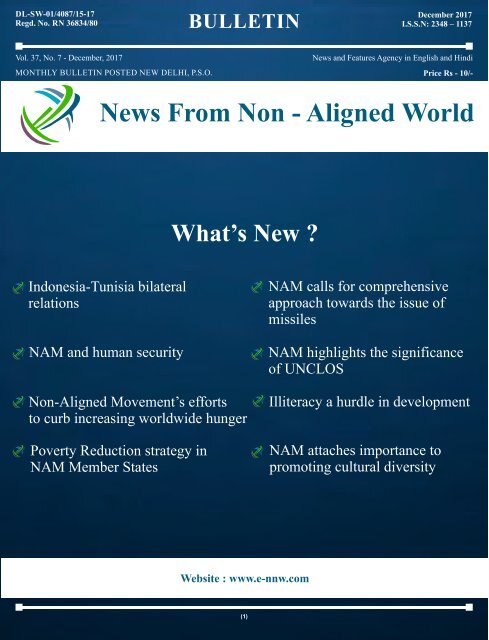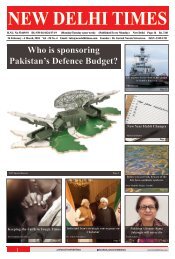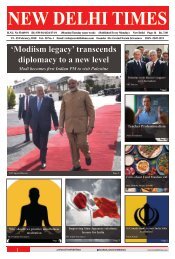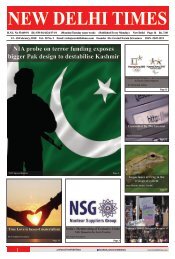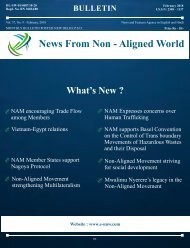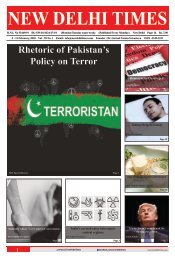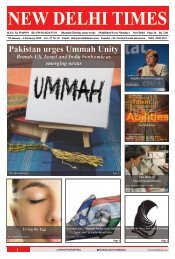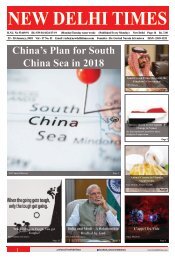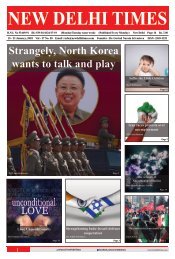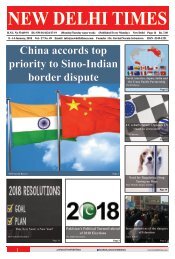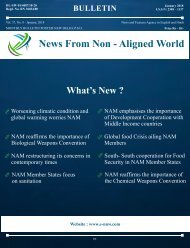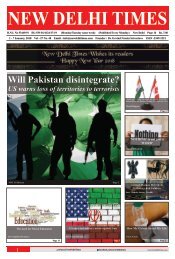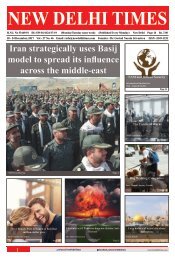You also want an ePaper? Increase the reach of your titles
YUMPU automatically turns print PDFs into web optimized ePapers that Google loves.
DL-SW-01/4087/15-17<br />
Regd. No. RN 36834/80<br />
BULLETIN<br />
December <strong>2017</strong><br />
I.S.S.N: 2348 – 1137<br />
Vol. 37, No. 7 - December, <strong>2017</strong><br />
MONTHLY BULLETIN POSTED NEW DELHI, P.S.O.<br />
News and Features Agency in English and Hindi<br />
Price Rs - <strong>10</strong>/-<br />
News From Non - Aligned World<br />
What’s New ?<br />
Indonesia-Tunisia bilateral<br />
relations<br />
NAM and human security<br />
Non-Aligned Movement’s efforts<br />
to curb increasing worldwide hunger<br />
Poverty Reduction strategy in<br />
NAM Member States<br />
NAM calls for comprehensive<br />
approach towards the issue of<br />
missiles<br />
NAM highlights the significance<br />
of UNCLOS<br />
Illiteracy a hurdle in development<br />
NAM attaches importance to<br />
promoting cultural diversity<br />
Website : www.e-nnw.com<br />
(1)
(2)
News From Non - Aligned World<br />
(3)
Vol. 37, No.7<br />
Month of Publishing - December, <strong>2017</strong><br />
I.S.S.N: 2348 – 1137<br />
Regd. No. RN 36834/80<br />
DL-SW-01/4087/15-17<br />
Dr.(Mrs.) Pramila Srivastava<br />
Dr. Ankit Srivastava<br />
Himanshu Sharma<br />
Sujay Dhawan<br />
Pawan Kumar<br />
- Editor-in-Chief<br />
- Editor<br />
- Deputy Director, Research<br />
- Director, Administration<br />
- Director, Development<br />
News From Non - Aligned World<br />
A-2/59, Safdarjung Enclave<br />
New Delhi - 1<strong>10</strong>029<br />
(India)<br />
Ph. No. : +91-11-26<strong>10</strong>2520<br />
Fax : +91- 11- 26196294<br />
E-mail<br />
Web<br />
: info@e-nnw.com<br />
: www.e-nnw.com<br />
Owner, Printer & Publisher<br />
Printed at<br />
Published at<br />
: Dr.(Mrs.)Pramila Srivastava<br />
: Sudhir Printers, 151, Desh Bandhu Gupta Market,<br />
Karol Bagh, New Delhi - 1<strong>10</strong>005<br />
: A-2/ 59, Safdarjung Enclave, New Delhi -1<strong>10</strong> 029 (INDIA)<br />
(4)
Index<br />
• Indonesia-Tunisia bilateral relations Pg.08<br />
• NAM and human security Pg.09<br />
• Non-Aligned Movement’s efforts to curb increasing Pg.<strong>10</strong><br />
worldwide hunger<br />
• Poverty Reduction strategy in NAM Member States Pg.11<br />
• NAM calls for comprehensive approach towards Pg.12<br />
the issue of missiles<br />
• NAM highlights the significance of UNCLOS Pg.13<br />
• Illiteracy a hurdle in development Pg.14<br />
• NAM attaches importance to promoting Pg.15<br />
cultural diversity<br />
(5)
(6)
From Editor’s Desk<br />
Non-Aligned Movement is based on the principles of peace,<br />
respect for rule of law and mutual respect. In this context,<br />
NAM has placed great significance on disarmament as well<br />
as respect for international law. NAM Member States have<br />
stood for disarmament. The Movement has thus called for a<br />
comprehensive approach towards the issue of missiles.<br />
NAM respects the principles of international law. NAM regards<br />
United Nations Convention on the Law of the Sea, 1982 as one<br />
of the most comprehensive legal instruments negotiated under<br />
the auspices of the United Nations.<br />
Promotion of human security is also an important objective<br />
pursued by NAM Member States. NAM Member States have<br />
undertaken a number of policy measures to address the issue<br />
of poverty, income inequality and illiteracy.<br />
The Movement also attaches great significance towards the<br />
promotion of cultural diversity.<br />
Dr. (Mrs.) Pramila Srivastava<br />
Editor - in - Chief<br />
(7)
News From Non -Aligned World<br />
Indonesia-Tunisia bilateral relations<br />
By IINS Research Team<br />
The recent visit of Indonesian Foreign Minister Retno<br />
Marsudi to Tunisia and the meeting between the<br />
Foreign Ministers of the two nations held in Tunis in<br />
October <strong>2017</strong> has further strengthened the bilateral<br />
relations between the two.<br />
Both Indonesia and Tunisia have based their foreign<br />
policy ideals on the principles of the Non-Aligned<br />
Movement. Besides the Non-Aligned Movement, the<br />
two nations participate in other multilateral forums<br />
such as the Organization of Islamic Countries (OIC).<br />
“At the <strong>10</strong>th Tunisia-Indonesia Joint Ministerial<br />
Session, both the nations agreed to increase<br />
cooperation in the field of counter terrorism,<br />
including in the context of intelligence cooperation,<br />
the prevention of funding for terrorism, the handling<br />
of foreign terrorist figures (FTF), as well as the<br />
radicalized program and interfaith dialogue. In this<br />
regard, the two Foreign Ministers of the two countries<br />
agreed to encourage the immediate completion of the<br />
MoU on counterterrorism cooperation”<br />
Indonesian contacts with Tunisia predates the latter’s<br />
independence in 1956. The relations and cooperation<br />
between the two countries started with the visit of<br />
Tunisian freedom fighter Habib Bourguiba to Jakarta<br />
followed by the establishment of Tunisian independence<br />
representative office in the city in 1952 to lobby the<br />
Asian nations support for Tunisian independence.<br />
Characters of the Tunisian independence movement<br />
were present at the Asian-African Conference in 1955,<br />
and then then Indonesia President Sukarno allowed<br />
the opening of Tunisia’s struggle for independence in<br />
Jakarta. Indonesia opened the Embassy in Tunis in<br />
1960, which also marked the opening of diplomatic<br />
relations between the two countries. The Tunisian<br />
Embassy in Jakarta opened on 14 October 1987.<br />
The issue of democracy is an important highlight in<br />
Indonesia-Tunisia relations. Tunisia has high regards for<br />
the successful functioning of democracy in Indonesia.<br />
During the transition period in Tunisia, the Indonesian<br />
government through Institute for Peace and Democracy<br />
(IPD) held a Workshop on Indonesia – Tunisia Capacity<br />
Building Partnership for Democracy: Dialogue on<br />
Empowering the Electoral Management Bodies from<br />
<strong>10</strong>-16 May 2013. The Dialogue aimed to accommodate<br />
the sharing of experiences and lesson learned on<br />
managing a peaceful and successful election with<br />
a legitimate result as well as establishing political<br />
consensus, particularly during the time of political<br />
transition. During the 2014 Indonesian presidential<br />
election, a group of representatives from Tunisia<br />
visited to Indonesia for observing the electoral process<br />
in the country. In 2014, when the implementation of<br />
democratic transition in Tunisia took place, it was<br />
applauded by the Indonesian political class, civil<br />
society, and the press. In an editorial Jakarta post<br />
lauded Tunisia for the nation’s strong commitment to<br />
transform itself into a fully democratic state.<br />
There are robust political ties between the two nations<br />
and both the nations strongly espouse the cause of the<br />
other in various multilateral forums. Tunisia supported<br />
the nomination of Indonesia in the UN Industrial<br />
Development Council (UNIDO) and International<br />
Maritime Organization Council Category while Indonesia<br />
supported Tunisia’s nomination in the Council of the<br />
United Nations Food and Agriculture Organization<br />
(FAO) and the Inter-governmental Committee for<br />
Physical Education and Sport (IGCPES).<br />
At the <strong>10</strong>th Tunisia-Indonesia Joint Ministerial Session,<br />
both the nations agreed to increase cooperation in the<br />
field of counter terrorism, including in the context of<br />
intelligence cooperation, the prevention of funding<br />
for terrorism, the handling of foreign terrorist figures<br />
(FTF), as well as the radicalized program and interfaith<br />
dialogue. In this regard, the two Foreign Ministers of<br />
the two countries agreed to encourage the immediate<br />
completion of the MoU on counterterrorism cooperation.<br />
There are strong economic ties between the two<br />
nations. The current volume of trade between Tunisia<br />
and Indonesia is between 120 and 150 million dinars<br />
(between 48 and 60 million U.S. dollars). The current<br />
investment of Indonesian companies in Tunisia has<br />
reached more than US $ <strong>10</strong>0 million in the oil and gas<br />
sector. Indonesia’s main export products to Tunisia<br />
are palm oil and its derivatives, while from Tunisia to<br />
Indonesia is the date. In 2014, the Tunisia Indonesia<br />
Business Association (TIBA) was inaugurated. TIBA<br />
is a forum of association for the enhancement of<br />
relations and cooperation network between Indonesian<br />
Contd.....On Page 16<br />
December, <strong>2017</strong><br />
(8)
NAM and human security<br />
The emergence of new security threats has led to a<br />
reconceptualization of the concept of security. Security<br />
in a post-Cold War world is not merely an absence<br />
from armed threat or war. The concept has undergone<br />
an expansion and has been moving away from<br />
traditional, state-centric conceptions of security that<br />
focused primarily on the safety of states from military<br />
aggression, to one that concentrates on the security<br />
of the individuals, their protection and empowerment.<br />
The term Human Security was first popularized by the<br />
United Nations Development Program in the early 1990s.<br />
It emerged in the post-Cold War era as a way to link<br />
various humanitarian, economic, and social issues in<br />
order to alleviate human suffering and assure security.<br />
The Commission for Human Security defines human<br />
security thus: “Human security means protecting<br />
fundamental freedoms – freedoms that are the essence<br />
of life. It means protecting people from critical (severe)<br />
and pervasive (widespread) threats and situations. It<br />
means using processes that build on people’s strengths<br />
and aspirations. It means creating political, social,<br />
environmental, economic, military and cultural systems<br />
that together give people the building blocks of survival,<br />
livelihood and dignity”. As a people-centered concept, human<br />
security places the individual at the ‘centre of analysis.’<br />
Non-Aligned Movement has reaffirmed the commitment<br />
to discuss and define human security in the UN<br />
General Assembly, in conformity with the principles<br />
enshrined in the Charter and taking into consideration<br />
the common understanding of the notion of the human<br />
security in General Assembly resolution 66/290. The<br />
UNGA Resolution 66/290 states that human security is<br />
an approach to assist Member States in identifying and<br />
addressing widespread and cross-cutting challenges<br />
to the survival, livelihood and dignity of their people.<br />
In accordance with the above UNGA resolution, NAM<br />
recognises that human security entails the right of<br />
people to live in freedom and dignity, free from poverty<br />
and despair. All individuals, in particular vulnerable<br />
people, are entitled to freedom from fear and freedom<br />
from want, with an equal opportunity to enjoy all<br />
their rights and fully develop their human potential.<br />
NAM Member States have implemented a range<br />
of national initiatives to promote human security.<br />
Mongolia is endeavouring to ensure human security of<br />
its people through both national action and international<br />
cooperation. Mongolia launched in late 2000 the Good<br />
News From Non -Aligned World<br />
By Dr. Ankit Srivastava, Editor<br />
Governance for Human Security Program aimed at<br />
improving the capacity to formulate and implement<br />
policies to ensure human security. This has resulted in<br />
securing national commitment by all the branches of<br />
the State power to its implementation; institutionalize<br />
the program’s implementation mechanism; and lay the<br />
groundwork for greater involvement and participation<br />
of the civil society, private sector and academia.<br />
“NAM Member States have implemented a range<br />
of national initiatives to promote human security.<br />
Mongolia is endeavouring to ensure human security<br />
of its people through both national action and<br />
international cooperation. Mongolia launched in<br />
late 2000 the Good Governance for Human Security<br />
Program aimed at improving the capacity to formulate<br />
and implement policies to ensure human security. This<br />
has resulted in securing national commitment by all<br />
the branches of the State power to its implementation;<br />
institutionalize the program’s implementation<br />
mechanism; and lay the groundwork”<br />
In Ecuador, the inclusion of human security in<br />
Ecuador’s constitution which is currently being<br />
realized through Plan Ecuador, a people-focused,<br />
preventive and multidimensional framework, aims to<br />
solve the interrelated problems of poverty, exclusion<br />
and violence. In Kenya, The Kenya Vision 2030 is the<br />
national long-term development blue-print that aims to<br />
transform Kenya into a newly industrialising, middleincome<br />
country. The Vision comprises of three key pillars:<br />
Economic; Social; and Political. The Economic Pillar<br />
aims to achieve an average economic growth rate of <strong>10</strong><br />
per cent per annum and sustaining the same until 2030.<br />
The Social Pillar seeks to engender just, cohesive<br />
and equitable social development in a clean and<br />
secure environment, while the Political Pillar aims<br />
to realise an issue-based, people-centred, resultoriented<br />
and accountable democratic system.<br />
The Movement further recognises that human<br />
security calls for people-centred, comprehensive,<br />
context-specific and prevention-oriented responses<br />
that strengthen the protection and empowerment<br />
of all people and all communities and that human<br />
security recognizes the inter-linkages between peace,<br />
development and human rights, and equally considers<br />
civil, political, economic, social and cultural rights.<br />
(9)<br />
December, <strong>2017</strong>
News From Non -Aligned World<br />
Non-Aligned Movement’s efforts to curb<br />
increasing worldwide hunger<br />
By IINS Research Team<br />
“Hunger is not an issue of charity. It is an issue of<br />
justice.”<br />
- Jacques Diouf<br />
The need for NAM back then during Cold War ushered<br />
in with factions dividing the world into two grabbing<br />
for power creating a vacuum between US led West and<br />
Soviet Union leading the East turning other nations as<br />
mere pawns to their own game of power and authority<br />
on the global chessboard.<br />
However, NAM came into existence bringing a<br />
balanced outlook and catering and protecting also<br />
while strengthening the developing countries. But<br />
in the present where the relevance of NAM has been<br />
questioned again and again Non-Aligned Movement<br />
has a very relevant and vital part to play with certain<br />
important issues facing the Southern countries on the<br />
globe. Of all poverty, illiteracy and space and hunger<br />
management rank at the top.<br />
In the 1994 Cartagena summit, the member nations<br />
of NAM clearly stated that from now on, the economic<br />
development of the countries will be given topmost<br />
priority and certain steps will be taken to resolve the<br />
financial crisis of these countries. In this regard, NAM<br />
stressed the strengthening of the “United Nation’s<br />
capacity and effectiveness in the field of development”.<br />
In the Cartegena summit, it has been stated that,<br />
although the general economic situation has recovered<br />
distinctly, in many cases, this development has<br />
benefited only a few who have accumulated unnecessary<br />
amounts of wealth and power, while unemployment, in<br />
various regions, has reached to an alarming magnitude<br />
and poverty is spreading inexorably, giving rise to grim<br />
social imbalances.<br />
The curse of hunger continues to terrorize and has<br />
dramatically increased and illiteracy continues,<br />
however, to be one of the greatest obstacles to the<br />
efforts to improve the living conditions of our peoples.<br />
Moreover, wide sectors of our societies continue to<br />
lack basic medical services, including drinking water,<br />
to satisfy their primary needs for survival. The Non-<br />
Aligned Movement continues to strive for peace,<br />
independence, sovereign equality of the States and<br />
non-intervention in their internal affairs, which some<br />
are now trying to disregard. At the same time will<br />
continue unflinchingly to work towards the economic<br />
and social betterment, the strengthening of democracy<br />
and the free determination of the peoples.<br />
This summit made it clear that from now on NAM will<br />
work to:<br />
1. “to promote the restructuring, revitalization and<br />
democratization of the United Nations based on the<br />
principles contained in its Charter, as well as the<br />
restructuring of the international financial system,<br />
including the Bretton Woods institutions, all in basis of<br />
the principle of sovereign equality of States.”<br />
2. “We consider essential the complete fulfilment of<br />
commitments agreed upon at the Children’s Summit<br />
at New York, the United Nations Conference on<br />
Environment and Development at Rio De Janeiro, the<br />
World Assembly of the Group of Education for All at<br />
Jon-Tien, the World Conference on Human Rights in<br />
Vienna, the International Conference on Population<br />
and Development at Cairo, the World Summit on<br />
Social Development at Copenhagen, and the IV World<br />
Conference on Women in Beijing, as well as those<br />
agreed on at the Uruguay Round.”<br />
3. “We shall persevere in our call for a once-and-forall<br />
settlement of the debt problems of the developing<br />
countries, including, in particular, multilateral, and the<br />
cancellation of debt of the least developing countries.”<br />
4. “Pursue reduction of military expenditures with the<br />
aim of devoting such resources towards the economic<br />
and social development of our peoples.”<br />
5. “We commit ourselves to eradicate illiteracy and<br />
poverty.”<br />
In addition, NAM has created three committees to resolve<br />
the issue of poverty and hunger, and to strengthen the<br />
economic condition of its member countries through<br />
co-operation, Standing Ministerial Committee for<br />
Economic Cooperation, High-Level Working Group for<br />
the Restructuring of the United Nations and Working<br />
Group on Human Rights.<br />
December, <strong>2017</strong><br />
(<strong>10</strong>)
Poverty Reduction strategy in<br />
NAM Member States<br />
By IINS Research Team<br />
“Lack of power is a universal and basic characteristic of<br />
poverty. Poverty is not solely a lack of income, but rather<br />
is characterized by a vicious cycle of powerlessness,<br />
stigmatization, discrimination, exclusion and material<br />
deprivation, which all mutually reinforce each other.”<br />
- Magdalena Sepúlveda Carmona (2013)<br />
In post-Cold War era, with the resolution of peace and<br />
disarmament, self-determination, economic equality,<br />
cultural equality and multilaterism, newly independent<br />
countries yoked together and refused to align<br />
themselves with any block or alliance led by the Unites<br />
States and Soviet Russia. At the Bandung Conference,<br />
in 1955, twenty nine Asian-African countries marked<br />
themselves as Neutral to power politics and zeroed down<br />
five principles called “Panchsheel” based on mutual<br />
“Non Aligned Movement has been successful<br />
in retaining neutrality during and after the<br />
Cold War. Arab, India, Yugoslav, Africa, Latin<br />
America were suffering both ideologically and<br />
psychologically as well as economically and<br />
socially after the WWII. Non-Alignment was<br />
a means to rebuild the politics of the country<br />
that needed to achieve a genuine national<br />
renaissance. The world of newly emergent<br />
countries is poverty-stricken and oppressed that<br />
long for a revolution of civilization. According to<br />
NAM, it is empowerment that can aid in bringing<br />
the NAM populace above poverty level”<br />
co-existence. India’s then Prime Minister Jawaharlal<br />
Nehru was believed to be the architect of this Non-<br />
Aligned Movement. While Fidel Castro announced<br />
the humanitarian zeal of the Movement, Non-Aligned<br />
Movement was founded to meet the fundamental<br />
needs of people struggling to achieve freedom, equality,<br />
justice, peace and emancipation from the colonialism,<br />
neo-colonialism, racism and hegemony by a repudiation<br />
of regimes founded on relation of dependency and<br />
dominion. It is in one way a positive treatise that aimed<br />
to avoid hostility to other countries and safeguard<br />
peace.<br />
Non Aligned Movement has been successful in retaining<br />
neutrality during and after the Cold War. Arab, India,<br />
Yugoslav, Africa, Latin America were suffering both<br />
ideologically and psychologically as well as economically<br />
and socially after the WWII. Non-Alignment was a<br />
means to rebuild the politics of the country that needed<br />
to achieve a genuine national renaissance. The world<br />
of newly emergent countries is poverty-stricken and<br />
oppressed that long for a revolution of civilization.<br />
According to NAM, it is empowerment that can aid<br />
in bringing the NAM populace above poverty level. It<br />
believes empowerment happens when individuals<br />
and organized groups are able to imagine their world<br />
differently and to realize that vision by changing the<br />
relations of power that have kept them in poverty,<br />
restricted their voice and deprived them of their<br />
autonomy.<br />
NAM understands that poverty remains a challenge<br />
forcing people to face other adverse conditions such<br />
as high levels of unemployment, food insecurity, and<br />
inadequate access to basic services such as energy<br />
(electricity); water and sanitation; health; and education<br />
services especially in rural and very remote areas. In this<br />
regard measures should provide people with tools that<br />
build resilience and self sufficiency to break the cycle<br />
of poverty. NAM suggests few basic means to empower<br />
the masses, thereby aiding in poverty reduction in NAM<br />
member states:<br />
Economic<br />
The main driver of empowerment is economic:<br />
Governments’ main role should be to deliver inclusive,<br />
pro-poor growth. In this approach, both the quantity<br />
and quality of a country’s growth are decisive in<br />
empowering poor people, both directly, in terms of<br />
liberating them from hunger and want, and indirectly,<br />
by providing them with the means to acquire education,<br />
voice and agency. Historical examples include the postwar<br />
reconstruction of Europe and Japan, and more<br />
recently, successive waves of East Asian “tigers” or<br />
Botswana’s sustained growth record.<br />
Social policy<br />
News From Non -Aligned World<br />
Governments such as Sri Lanka, or more recently,<br />
Brazil have used effective social policy to empower<br />
people living in poverty by providing access to quality<br />
Contd.....On Page 16<br />
(11)<br />
December, <strong>2017</strong>
News From Non -Aligned World<br />
NAM calls for comprehensive approach<br />
towards the issue of missilesBy IINS Research Team<br />
Missiles continue to be a focus of increased international<br />
attention, discussion and activity. Their potential to<br />
carry and deliver weapons of mass destruction (WMD)<br />
payload quickly and accurately makes missiles a<br />
qualitatively significant political and military issue.<br />
In addition, the diversity of international views on<br />
matters related to missiles poses a particular challenge<br />
for efforts to address the issue in multilateral fora.<br />
These concerns are related to, inter alia, the increasing<br />
number, range, technological sophistication and<br />
geographic spread of missiles and their capability of<br />
delivering weapons of mass destruction, in particular<br />
nuclear weapons, as well as conventional weapons,<br />
missile defences and their strategic consequences, the<br />
potential use of space-launch vehicle technology for the<br />
development of missiles, the role of missiles in military<br />
doctrines as well as the role and scope of confidencebuilding<br />
measures<br />
NAM Member States are committed to establishing a<br />
peaceful international order based on a rule of law. As<br />
part of promoting the principle of disarmament, NAM<br />
has highlighted the need for a multilaterally negotiated,<br />
universal, comprehensive, transparent and nondiscriminatory<br />
approach toward the issue of missiles in<br />
all its aspects as a contribution to international peace<br />
and security. NAM has expressed its support for efforts<br />
to be continued within the UN to explore further the<br />
issue of missiles in all its aspects.<br />
In this regard, NAM has emphasized the contribution<br />
of peaceful uses of space technologies, including space<br />
launch vehicle technologies, to human advancement,<br />
such as for telecommunications and data gathering on<br />
natural disasters. The Movement has emphasized the<br />
need to keep the issue of missiles in all its aspects on<br />
the agenda of the UN General Assembly and welcomed<br />
that the Panel of Governmental Experts established<br />
in accordance with Resolution 59/67 successfully<br />
concluded its work in 2008 and submitted its report to<br />
the 63rd session of the UN General Assembly.<br />
The Movement has encouraged follow up efforts<br />
to further examine the elements contained in the<br />
conclusions of the UN Secretary- General’s Report<br />
A/63/176. The report discusses the background and<br />
present situation with regard to missiles, and identifies<br />
a number of key issues which should be taken into<br />
account in order to address, in a comprehensive<br />
manner, the issue of missiles in all its aspects. These<br />
issues include, inter alia, the global and regional<br />
security backdrop which provides the motivation (or lack<br />
thereof) for missile development, testing, production,<br />
acquisition, transfer, possession, deployment and use;<br />
the circumstances of transfer to and use of certain<br />
types of missiles and missile technology by State or<br />
non-State actors; the issue of disarmament, arms<br />
control and non-proliferation; the interrelation between<br />
doctrines, strategies and missile-related behaviour; the<br />
relative salience of ballistic and cruise missiles as well<br />
as missiles as delivery vehicles for weapons of mass<br />
destruction or conventional arms; missile defence; and<br />
the increased contribution of space-based capabilities<br />
to a wide range of human endeavours.<br />
NAM agrees with the conclusion of the report that it<br />
is important to have continued international efforts to<br />
deal with the increasingly complex issue of missiles in<br />
the interest of international peace and security, and<br />
“NAM Member States are committed to establishing a<br />
peaceful international order based on a rule of law.<br />
As part of promoting the principle of disarmament,<br />
NAM has highlighted the need for a multilaterally<br />
negotiated, universal, comprehensive, transparent<br />
and non-discriminatory approach toward the issue<br />
of missiles in all its aspects as a contribution to<br />
international peace and security”<br />
to further deliberate on the issue, specifically focusing<br />
attention on existing and emerging areas of consensus.<br />
In this context, NAM has emphasized the important role<br />
of the United Nations in providing a more structured<br />
and effective mechanism to build such a consensus.<br />
NAM’s firm position is that pending the achievement of<br />
such a universal approach related to delivery systems<br />
for weapons of mass destruction, any initiative to<br />
address these concerns effectively and in a sustainable<br />
and comprehensive manner should be through an<br />
inclusive process of negotiations in a forum where all<br />
States could participate as equal. The Movement thus<br />
stresses the importance of the security concerns of all<br />
States at regional and global levels in any approach to<br />
the issue of missiles in all its aspects.<br />
December, <strong>2017</strong><br />
(12)
News From Non -Aligned World<br />
NAM highlights the significance of UNCLOS<br />
By IINS Research Team<br />
The United Nations Convention on the Law of the Sea<br />
(UNCLOS), also known as the Law of the Sea Treaty, is<br />
the international agreement that defined the limits of<br />
the territorial seas of nations and the areas in which<br />
they could exploit marine resources. It also established<br />
the rules for the use of the high seas for international<br />
navigation, and outlined the rights and responsibilities<br />
of nations in the protection of the marine environment.<br />
The Convention, concluded in 1982 came into force in<br />
1994.<br />
More than thirty years after its opening for signature<br />
and twenty years after its entry into force, UNCLOS<br />
continues to provide an effective, comprehensive<br />
and overarching international legal framework for<br />
the oceans and seas. The UN General Assembly<br />
has recognized the pre-eminent contribution of the<br />
Convention to the strengthening of peace, security,<br />
cooperation and friendly relations among all nations, to<br />
the promotion of the economic and social advancement<br />
of all peoples of the world, as well as to the sustainable<br />
development of the oceans and seas. Because UNCLOS<br />
covers a wide range of ocean issues, it also provides<br />
the legal framework for their sustainable development.<br />
UNCLOS has thus emerged as an important part of<br />
the international legal system and also serves as an<br />
important instrument for the protection of the marine<br />
environment.<br />
Non-Aligned Movement regards United Nations<br />
Convention on the Law of the Sea, 1982 as one of<br />
the most comprehensive legal instruments negotiated<br />
under the auspices of the United Nations.<br />
The Movement has emphasized its importance for<br />
its States Parties as the primary instrument which,<br />
inter alia, confers rights on coastal states for the<br />
exploration and exploitation of the living and nonliving<br />
marine resources within national jurisdiction,<br />
as well as establishes a framework for access by other<br />
states to these resources and defines the rights and<br />
responsibilities of states in their use of the world’s<br />
oceans, including their general obligations to protect<br />
and preserve the marine environment. NAM has also<br />
highlighted the importance of the designation by the<br />
Convention of the seabed, subsoil and ocean floor<br />
beyond national jurisdiction as the common heritage<br />
of mankind, as well as the establishment of the<br />
International Seabed Authority, to organize, control<br />
and administer all activities of the state parties in the<br />
Area on behalf of the international community and<br />
in accordance with the pertinent provisions of the<br />
Convention.<br />
“Non-Aligned Movement regards United Nations<br />
Convention on the Law of the Sea, 1982 as one<br />
of the most comprehensive legal instruments<br />
negotiated under the auspices of the United<br />
Nations. The Movement has emphasized its<br />
importance for its States Parties as the primary<br />
instrument which, inter alia, confers rights on<br />
coastal states for the exploration and exploitation<br />
of the living and non-living marine resources<br />
within national jurisdiction, as well as establishes<br />
a framework for access by other states to<br />
these resources; and defines the rights and<br />
responsibilities of states in their use of the world’s<br />
oceans, including their general obligations to protect<br />
and preserve the marine environment”<br />
Prominent NAM Member States are party to UNCLOS.<br />
India is party to the United Nations Convention on the<br />
Law of the Sea (UNCLOS), the Agreement relating to the<br />
Implementation of Part XI of the UNCLOS; and the 1995<br />
United Nations Fish Stocks Agreement. India has been<br />
a member of the Council of the International Seabed<br />
Authority and its experts are elected to its Finance<br />
Committee and the Legal and Technical Commission.<br />
Also, an Indian scientist is regularly elected to the<br />
Commission on the Limits of the Continental Shelf<br />
established under the UNCLOS. Further, an Indian<br />
jurist has been an elected judge of the International<br />
Tribunal for the Law of the Sea since its establishment<br />
in 1996.<br />
Vietnam, another prominent NAM Member State<br />
has actively applied relevant provisions of general<br />
international law since the adoption of the UNCLOS,<br />
to develop its legislative and regulatory acts relating<br />
to the sea. In conformity with the progressive trend of<br />
international maritime law, Vietnam has promulgated<br />
“Declaration on the Territorial Sea, Contiguous Zone,<br />
Exclusive Economic Zone and Continental Shelf” in<br />
1977 establishing the Exclusive Economic Zone of 200<br />
Contd.....On Page 16<br />
(13)<br />
December, <strong>2017</strong>
News From Non -Aligned World<br />
Illiteracy a hurdle in development<br />
By IINS Research Team<br />
“One child, one teacher, one book and one pen can<br />
change the world”<br />
- Malala<br />
In 1955, at a conference held at Bandung, Indonesia<br />
the Non-Aligned Movement was born. The basic<br />
principles or concerns of NAM are to struggle against<br />
all forms of imperialism, to keep co-operation and close<br />
terms of friendship with all countries, disarmament<br />
and international security so on and so forth. Basically,<br />
the aim of NAM is to “shape a better world”, create an<br />
equitable world.<br />
as a fundamental human right and necessary for global<br />
relations. They felt that illiteracy of people becomes one<br />
of the reasons for suffering and to attain peace in real<br />
sense, education for all should be promoted.<br />
NAM not only recurrently urges its member states to<br />
take heed of the steps to eradicate illiteracy but has<br />
launched several programs and campaigns to do so in<br />
several of its member states. From educating the poor,<br />
marginalized, unfortunate, gifted, it has also opened<br />
doors for illiterate adults – providing a second chance<br />
at life.<br />
“NAM has stressed the need of equality and<br />
development, and to realize its dream of<br />
a better world, NAM has given importance<br />
and emphasis to development of its<br />
member countries, eradication of poverty<br />
and illiteracy. The steps NAM has taken to<br />
eradicate poverty and establish equality<br />
in this world are commendable. One of the<br />
major concerns of the movement has always<br />
been upgrading the standard of living of the<br />
people of the member countries ”<br />
Although, the basic thrust of the movement is in favour<br />
of peace, disarmament and security, NAM has stressed<br />
the need of equality and development, and to realize<br />
its dream of a better world, NAM has given importance<br />
and emphasis to development of its member countries,<br />
eradication of poverty and illiteracy. The steps NAM has<br />
taken to eradicate poverty and establish equality in this<br />
world are commendable. One of the major concerns of<br />
the movement has always been upgrading the standard<br />
of living of the people of the member countries.<br />
Non-Aligned Movement in the contemporary times has<br />
become a means to rebuild the politics of the countries<br />
that need to achieve a genuine national renaissance.<br />
The world of newly emergent countries are povertystricken<br />
and oppressed that long for a revolution of<br />
civilization.<br />
After the fourth Summit in Algiers, Non-Aligned<br />
Movement unfurled a new campaign for justice and<br />
education. Non-Aligned Movement regarded education<br />
The National Literacy Campaign started on April 15,<br />
1961. On December 22, Cuban Revolutions heralded<br />
with the success news of the initial phase of National<br />
Literacy Campaign. Cuban rural illiteracy was reduced<br />
to 4% from 42%. Fidel Castro exclaimed that “This<br />
literacy campaign will give opportunities to those who<br />
were denied an education for economic and social<br />
reason….They must be helped; they must be pursued<br />
that they can study.” He also expressed his educational<br />
plans to be carried out in the fields of science and<br />
technology. Latin American and Caribbean Pedagogical<br />
University received the UNESCO award for assisting<br />
other countries in this innovative literacy method.<br />
Bolivia aims to end illiteracy by the year 2008 with the<br />
support of Cuba and Venezuela. Aymara and Quechua<br />
Indigenous people are started learning to read and<br />
write in their mother tongue language.<br />
14th Summit of Non-Aligned Movement reported that<br />
2.3 million people in fifteen countries, including Mexico<br />
and New-Zealand are presently under the scheme of<br />
National Literacy Campaign. Requests are coming from<br />
Gambia, Nigeria, Grenada, St Kitts and Navis for Cuba<br />
to send advisors to start the method.<br />
The theoretical regimes of Non-Aligned Movement have<br />
materialized in the means of spreading education to<br />
post independent countries.<br />
These efforts taken by NAM collectively and members<br />
of the collaboration in each country have started to<br />
make a difference which will showcase their potential<br />
gradually. Things have improved for better as the<br />
member nations have taken up things in their hands<br />
and have started their march to override illiteracy,<br />
hence preparing to combat the evils of the society one<br />
at a time, providing an impact on a broader scale.<br />
December, <strong>2017</strong><br />
(14)
NAM attaches importance to promoting<br />
cultural diversity<br />
By Dr. Pawan Mathur<br />
The 120 Member Non-Aligned Movement is no stranger<br />
to cultural diversity and the largest collective grouping<br />
of the developing world is a testament to the fact that<br />
the principle of unity in diversity can be achieved.<br />
In this context, a Political Declaration and Action<br />
Programme of the NAM on human rights and cultural<br />
diversity was adopted recently at the 72nd session of<br />
the UN General Assembly, where the Movement had<br />
organised an event: Solidarity, Dialogue and Tolerance<br />
in a Diverse World: Towards a Culture of Peace”.<br />
NAM countries also vowed to foster a culture of peace<br />
in line with the UN Charter towards the realisation<br />
of human rights while encouraging the promotion<br />
of cultural diversity via dialogue and cooperation.<br />
The Movement backs a constructive dialogue and<br />
cooperation on the basis of mutual respect and no<br />
interference in internal affairs of sovereign countries.<br />
NAM believes that it is necessary to have a balanced<br />
and comprehensive approach to fostering and ensuring<br />
human rights and has reiterated that economic,<br />
cultural and social rights should be respected as<br />
political and civil rights, with regards to development<br />
level, history and specific features of each nation. NAM<br />
has recognized the ever-increasing significance and<br />
relevance of a culture of living in harmony with nature,<br />
which is inherent in nomadic civilization, in today’s<br />
world.<br />
With the underlying objective of promoting cultural<br />
diversity, NAM has reaffirmed the importance of the<br />
Convention on the protection and promotion of Diversity<br />
of cultural expressions by UNESCO, which signed in<br />
2005 and entered into force on 18 March 2007, as a<br />
major contribution to the international community<br />
in the definition of a framework of the Universal<br />
Declaration on Cultural Diversity and called upon<br />
United Nations Member States to consider becoming<br />
parties to this Convention. While calling for promotion<br />
of cultural diversity, NAM follows the guiding principles<br />
of the above referred UNESCO Conventions.<br />
These guiding principles are enumerated as follows:<br />
News From Non -Aligned World<br />
communication, as well as the ability of individuals to<br />
“NAM believes that it is necessary to have a<br />
balanced and comprehensive approach to fostering<br />
and ensuring human rights and has reiterated<br />
that economic, cultural and social rights should be<br />
respected as political and civil rights, with regards<br />
to development level, history and specific features of<br />
each nation. NAM has recognized the ever-increasing<br />
significance and relevance of a culture of living in<br />
harmony with nature, which is inherent in nomadic<br />
civilization, in today’s world”<br />
choose cultural expressions, are guaranteed. No one<br />
may invoke the provisions of this Convention in order<br />
to infringe human rights and fundamental freedoms<br />
as enshrined in the Universal Declaration of Human<br />
Rights or guaranteed by international law, or to limit<br />
the scope thereof.<br />
2) States have, in accordance with the Charter of the<br />
United Nations and the principles of international law,<br />
the sovereign right to adopt measures and policies to<br />
protect and promote the diversity of cultural expressions<br />
within their territory.<br />
3) The protection and promotion of the diversity of<br />
cultural expressions presuppose the recognition of<br />
equal dignity of and respect for all cultures, including<br />
the cultures of persons belonging to minorities and<br />
indigenous peoples.<br />
4) International cooperation and solidarity should be<br />
aimed at enabling countries, especially developing<br />
countries, to create and strengthen their means of<br />
cultural expression, including their cultural industries,<br />
whether nascent or established, at the local, national<br />
and international levels.<br />
5) Since culture is one of the mainsprings of development,<br />
the cultural aspects of development are as important<br />
as its economic aspects, which individuals and peoples<br />
have the fundamental right to participate in and enjoy.<br />
1) Cultural diversity can be protected and promoted<br />
only if human rights and fundamental freedoms,<br />
such as freedom of expression, information and<br />
6) Cultural diversity is a rich asset for individuals and<br />
societies. The protection, promotion and maintenance<br />
of cultural diversity are an essential requirement for<br />
(15)<br />
December, <strong>2017</strong>
News From Non -Aligned World<br />
sustainable development for the benefit of present and<br />
future generations.<br />
7) Equitable access to a rich and diversified range<br />
of cultural expressions from all over the world and<br />
access of cultures to the means of expressions and<br />
dissemination constitute important elements for<br />
enhancing cultural diversity and encouraging mutual<br />
understanding.<br />
8) When States adopt measures to support the diversity<br />
of cultural expressions; they should seek to promote, in<br />
an appropriate manner, openness to other cultures of<br />
the world.<br />
NAM recognises the importance of respect and<br />
understanding for religious and cultural diversity<br />
throughout the world, of choosing negotiations over<br />
confrontation and of working together and not against<br />
each other. The Movement firmly believes that such<br />
values holds the key to almost all of multilateral<br />
objectives.<br />
Indonesia-Tunisia bilateral......<br />
and Tunisian business actors in trade, investment,<br />
development and tourism. During his recent visit to<br />
Tunisia, the Indonesian Foreign Minister Marsudi paid<br />
a courtesy call to the Tunisian Prime Minister Youssef<br />
Chahed and during the meet economic cooperation was<br />
the focus of discussion.<br />
The two nations also cooperate in the field of capacity<br />
building and technical cooperation. Indonesia has<br />
Poverty Reduction strategy......<br />
health, education, water and sanitation systems, along<br />
with social protection systems.<br />
This has enabled poor and excluded groups to acquire<br />
rights and voice earlier in the development trajectory,<br />
with no need to wait for the benefits of economic growth<br />
to trickle down.<br />
Good governance<br />
Contd.....from Page 8<br />
conducted 11 technical cooperation programs,<br />
followed by 34 participants from Tunisia in various<br />
fields such as water management , micro-financing ,<br />
democracy, election management, anti-corruption and<br />
good governance. Indonesia has invited participants<br />
from Tunisia to participate in the Indonesia Technical<br />
Cooperation Program for 2018 including in agriculture,<br />
SMEs, maritime and fisheries, family planning and<br />
democracy.<br />
Contd.....from Page 11<br />
through transparency and access to information, use of<br />
information, decentralization, participatory governance<br />
reforms and communication technologies, mass registration<br />
drives, anti-corruption measures and ensuring access to<br />
justice and a free media.<br />
Empowerment from below<br />
Empowerment can be achieved through protest and<br />
organization by people living in poverty.<br />
Governments should focus on creating an enabling<br />
institutional environment for empowerment, for example<br />
The key role of the State is to respond positively to such<br />
pressures (and not attempt to suppress them).<br />
NAM highlights the significance......<br />
nautical mile (nm), extending the rights of Vietnam to<br />
the sea, not just confined to the right to fishing rights,<br />
but also other sovereign rights and jurisdiction.<br />
Contd.....from Page 13<br />
Zone, thus contributing to the development and<br />
consolidation of the practice of States, which later on<br />
became an important institution of the UNCLOS.<br />
With this Declaration, Vietnam together with Kenya,<br />
Myanmar, Cuba, Yemen, Dominique, Guatemala, India,<br />
Pakistan, Mexico and Seychelles were the pioneering<br />
states in developing the concept of Exclusive Economic<br />
NAM thus regards UNCLOS as a significant instrument<br />
of international law and also highlights its importance<br />
for the conservation and sustainable use of marine<br />
biological diversity.<br />
December, <strong>2017</strong><br />
(16)
Regd. No. RN 36834/80<br />
Phone : 26<strong>10</strong>2520, 26<strong>10</strong>5846<br />
Fax : (91-11) 26196294<br />
E-mail : info@e-nnw.com<br />
Web : www.e-nnw.com<br />
NEWS FROM NON-ALIGNED WORLD<br />
(A News and Features Agency in English and Hindi)<br />
SUBSCRIPTION FORM<br />
Name:____________________________________________________________________________________<br />
Company/Department : ______________________________________________________________________<br />
Office Address : ___________________________________________________________________________<br />
________________________________________________________________________________________<br />
Phone : _______________________________________Fax : ____________________________________<br />
E- mail : ______________________________________Web : ___________________________________<br />
Residence Address : ________________________________________________________________________<br />
_______________________________________________________________________________________<br />
Phone : ______________________________________ E-mail : ___________________________________<br />
Date ......................... .............................................................<br />
Signature<br />
Note : Please fill the above form and send us for the continued delivery of NNW Bulletin.<br />
(17)
(18)
(19)
DL-SW-01/4087/15-17<br />
Regd. No. RN 36834/80 Total Pages - 20<br />
Month of Publishing - December, <strong>2017</strong><br />
Month of Posting - December, <strong>2017</strong><br />
News From Non - Aligned World<br />
www.e-nnw.com<br />
Owner, Printer and Publisher: Dr. (Mrs.) Pramila Srivastava, Printed at Sudhir Printers, 151, Desh Bandhu Gupta Market,<br />
Karol Bagh, New Delhi - 1<strong>10</strong>005, Published at A-2/59 Safdarjung Enclave, New Delhi-1<strong>10</strong>029.<br />
(20)


